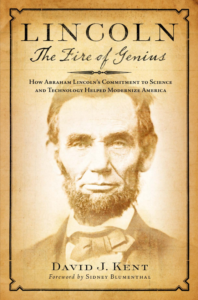Well, it’s been a busy week for Lincoln: The Fire of Genius (and me, as its author). Three big presentations, two award nominations, and one award non-nomination. Here’s a quick rundown.
After participating in two Lincoln-related Zoom calls on Monday, Tuesday evening was the official Lincoln: The Fire of Genius book launch in conjunction with the Lincoln Group of DC. Around forty people jammed into the banquet hall at Maggiano’s Little Italy restaurant in Chevy Chase (Washington, DC) for a grand celebration. There was a happy hour, a grand multi-course dinner, and even some swag bags full of cool Abraham Lincoln stuff (check your bags closely because some of that “stuff” could be priceless artifacts). This was followed by my presentation about the big ideas behind the book, which is foreshadowed by its subtitle: How Abraham Lincoln’s Commitment to Science and Technology Helped Modernize America. The live event was also broadcast on Zoom to people across the country and was recorded by C-SPAN for video broadcast soon. When I have the specifics on the C-SPAN video, I’ll post the link here.

But that was just the start of the week. Another Zoom call on Wednesday, then on to a presentation at an exclusive club in downtown Washington, DC to talk Lincoln, Science, and Technology during the Civil War. I was honored with a great surprise – Sidney Blumenthal, the exceptional multi-volume author of the Political Life of Abraham Lincoln series who graciously wrote the foreword for The Fire of Genius – was a special guest of one of the members. I hadn’t known he would be there, and it was wonderful to have his support. Introducing me was club member Marc Rothenberg, who was director of the Joseph Henry Papers for the Smithsonian for 25 years before spending a decade at the National Academy of Sciences. Marc had given me considerable insight into Henry, the first Secretary of the Smithsonian and a key advisor to President Lincoln.

The week ended with a spectacular dedication and unveiling of an incredible new memorial to famed Civil War photographer Mathew Brady. Brady is buried in Congressional Cemetery, so I joined about fifty people to see a new installation, the brainchild of photohistorian Larry West. This new monument includes two large marble columbaria with inlaid photos related to Mathew Brady. But Brady isn’t the only subject – there are life-size bronze statues of both Abraham Lincoln and Frederick Douglass, as well as a bronze replica of a Brady camera of the time period. I gave one of four short speeches that day honoring Brady, Lincoln, and the importance of photographic technology to American memory. Indeed, the event itself was unforgettable. Look for more details and photos on the Lincolnian.org website shortly.

And then there were the award nominations. On Thursday I find out that I did not quite make the longlist of ten books for the highly prestigious National Book Awards. I had been told I was in the running for the longlist (which consists of 10 books out of more than 600 considered), but it was not to be. However, Friday brought better news. My editor forwarded me the notice from the LA Times book prize committee that Lincoln: The Fire of Genius had been nominated for consideration of their annual award. The finalists will be named in February 2023 (just in time for Lincoln’s birthday), with the winner announced at an April banquet in Los Angeles. Fingers crossed.
Friday also brought confirmation that the book is being considered for the Abraham Lincoln Institute book award (given in March 2023) and the Gilder Lehrman Lincoln Prize (given in April 2023). There are two other awards in the works that also offer strong possibilities. I’ll have more on those as details are announced.
This week gives me a bit of a break from presenting, which is good because there are many additional appearances coming up that I need to prepare for. Unlike some people who essentially give the same presentation no matter who the audience is, I tend to tailor mine to the group (big picture for Lincoln Group of DC, Civil War focus for Civil War Round Tables, Arts and Science for the Arts Club, etc.). Both Abraham Lincoln and the book are so far-reaching that there is plenty of material to fit whatever venue and audience interested. Several more opportunities are in the works. A continually updated listing can be found on my media page: https://davidjkent-writer.com/media/.
[Photos, top to bottom: Book launch signing by Dan Kreske; Sidney Blumenthal by David J. Kent; Congressional Cemetery by anonymous]

Lincoln: The Fire of Genius: How Abraham Lincoln’s Commitment to Science and Technology Helped Modernize America was released on September 1, 2022.
The book is available for purchase at all bookseller outlets. Limited signed copies are available via this website. The book also listed on Goodreads, the database where I keep track of my reading. Click on the “Want to Read” button to put it on your reading list. Please leave a review if you like the book.
You also follow my author page on Facebook.
David J. Kent is President of the Lincoln Group of DC and the author of Lincoln: The Fire of Genius: How Abraham Lincoln’s Commitment to Science and Technology Helped Modernize America and Lincoln: The Man Who Saved America.
His previous books include Tesla: The Wizard of Electricity and Edison: The Inventor of the Modern World and two specialty e-books: Nikola Tesla: Renewable Energy Ahead of Its Time and Abraham Lincoln and Nikola Tesla: Connected by Fate.










